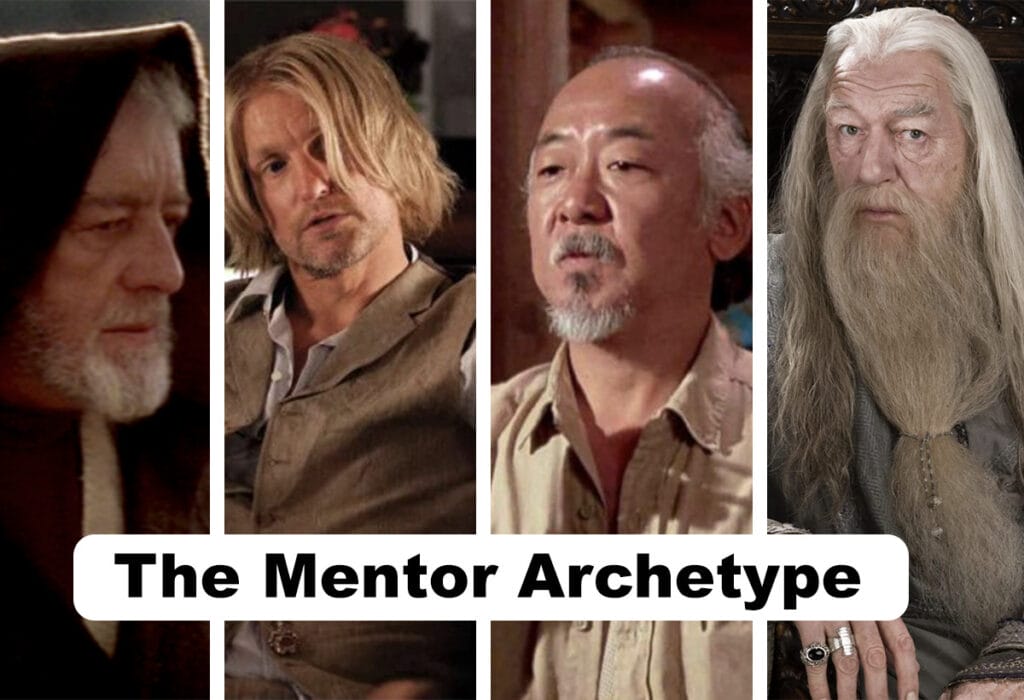Many of the most popular and beloved characters out there are based on the mentor archetype. We read for a reason, and sometimes without knowing it, we read to learn about life and the complexities of it. Through a main character, the mentor can preach and teach, and those messages come through to us as readers.
If you’re writing a novel and want to impart wisdom and share an impactful theme, there are few ways better to do so than using a mentor character to do it.
But these characters aren’t as simple as writing a wise sage and being done with it. Certain stories are better suited for the mentor archetype than others, so it’s important to know the differences.
Here’s what I’ll cover about the mentor archetype:
- What is the mentor archetype?
- Examples of Famous Mentor Archetypes
- The Effect of the Mentor on a Story
- Tips for Writing a Mentor Character
What is the mentor archetype?
The mentor archetype is a character that most often guides the main character in a skill, journey, and challenges by using their past experience, skillsets, and wisdom. They serve as a pillar of growth for the main character’s arc and are often a complete character already.
Meaning, the mentor character doesn’t usually have its own character arc because their backstory was responsible for that. You can think of this character as one that’s already been fully developed, and therefore tends to be steady and constant as opposed to a character who grows and changes.
Character archetypes in general are great to use, but remember that they’re a guide to shape a character and not a list of instructions. Each mentor will be different, as you can see from the examples below.
Examples of Famous Mentor Archetypes
You already probably have some mentor characters in your mind. There are a ton of them, and this is by no means an exhaustive list of mentor archetype examples.
But they are some of the most recognizable and loved, for a reason. Study these mentors if you want to have a broad view of both good and “evil” mentor archetypes to learn from.
1. Gandalf in The Lord of the Rings
Gandalf, the wise and powerful wizard, serves as a beacon of wisdom for Frodo Baggins and the Fellowship. His knowledge of Middle-earth’s history and his understanding of the One Ring are instrumental in guiding Frodo on his perilous quest.
He’s someone the characters can look to for an example, while also serving the purpose as a sort of savior in the story. Many mentor characters end up saving your main character during some challenges, further proving their capability in whatever skill was needed.
2. Obi-Wan Kenobi (and more) in Star Wars
Obi-Wan Kenobi is the epitome of a Jedi mentor, guiding both Anakin Skywalker and later, Luke Skywalker. His teachings and sacrifices shape the destiny of the galaxy. In general, Star Wars is full of the mentor archetype (and the hero’s journey).
You see this at work in the spin-offs on Disney+ as well. Rebels follows the story of a character and the mentors he works with while rebelling, and Ahsoka picks up with her own journey as a mentor (called a Master in this world), after we see her being mentored in Clone Wars. Mentors are all over these stories!
3. Professor Dumbledore in the Harry Potter series
Albus Dumbledore, the headmaster of Hogwarts, embodies the mentor archetype in the Harry Potter series. He imparts crucial knowledge and guidance to Harry, helping him navigate the magical world and face the challenges that lie ahead.
You can see from early on that Dumbledore takes Harry under his wing in more ways than just with magic. He talks about his life, his parents. He gives him guidance and advice about the challenges we face in life and not just with magic.
Harry also had other mentors, of course, but Dumbledore is the most primary one.
4. Morpheus in The Matrix
Morpheus serves as a guide and mentor to Neo, helping him realize his true potential and purpose in the world of the Matrix. His unwavering belief in Neo’s abilities is central to Neo’s transformation into “The One.”
With the mentor archetype, the person isn’t only their teacher, they also serve as an encourager. Being able to tell the main character to keep going when they feel like giving is can serve a powerful purpose for the plot of your story.
5. Haymitch in The Hunger Games
This is a great example of a mentor who isn’t perfect. Most writers think the mentor character has to be good in order to be the mentor. Haymitch actually has a character arc and grows over time, but still serves as the mentor archetype to Katniss and Peeta as they navigate the Hunger Games based on his own experience of winning it.
Plus, in later stories (spoiler), he redeems himself in many ways and becomes more of the mentor figure we think of when discussing this archetype.
6. Mr. Miyagi in The Karate Kid
Of course Mr. Miyagi makes this list! You could also save that he’s a sage archetype as well. He takes the karate kid and runs him through practices and skills meant to train him in the art of karate, even if the kid sometimes thinks it’s all bullcrap. He’s unyielding in his lessons and the outcome says it all.
This is definitely an interesting example of how the mentor and the main character and seem and be very different from one another. But by the end, we realize just how much alike they are and that story arc is really beautiful.

The Effect of the Mentor on a Story
Whether or not you use a mentor character has to do with the effect you want this character to have. Some characters can be teachers, professors, or trainers without necessarily being the mentor.
To decide if this is the right archetype for you, here are a few ways a mentor can affect your story:
- Helps the character arc: your mentor serves a huge purpose in the story, and it has to do with your main character’s arc. The mentor will point out areas for the character to grow and then lead them into that growth. It makes for a more certain ending to the character’s arc. The idea of “the student becomes the master” is evidence of when a character arc has closed.
- Give character goals and motivations: the mentor archetype will give a set of instructions, lessons, rules, and plans for your main character to succeed. We all know that characters often break those rules or skips lessons, and that’s where conflict comes into play. But having the goal from the mentor allows readers to know the path the character should be on, so they see when they’ve come off track.
- Exposition: this is a huge benefit of a mentor archetype. Your main character has to learn things about the world, setting, or people in your story. The mentor can teach them in a way that also teaches the reader at the same time. This is great because otherwise, you run into issues using exposition in a way that’s not interested and more info-dumping than proper exposition. Have a character like this makes it more natural and allows the reader to have a better understanding of the world.
The mentor archetype is a character, yes, but they’re also a tool you’re using to tell the story. They will have a purpose in your novel and you’ll have to decide how this character affects the story.
Many stories with the hero’s journey use the mentor as a way for the hero to become a hero instead of the (oftentimes) lowly kid who’s not that special. Don’t create a mentor just for the sake of it. Make sure they’re intentional, and therefore, have the desired effect you want.
8 Tips for Writing a Mentor Character
I’ve done it! I’ve convinced you to use the mentor archetype and now you want a few more tips to write them well. While these will definitely help you craft this type of character, keep in mind that a lot more goes into a novel than just the archetype.
That said, here’s more to know about writing a mentor character:
1. Create depth and flaws
While mentors are often portrayed as wise and all-knowing, it’s important to remember that they should still be multi-dimensional characters. Give them their own history, motivations, and flaws. This adds depth and makes them more relatable to readers.
It can also be even more interesting when you craft the flaws based on your main character. Perhaps they both struggle with the same flaw. Maybe their flaws are opposite, which leads the mentor to give poor coaching to the main character in an effort to feel better about themselves.
Flawed mentors are still a thing. Just look at Haymitch! Even Dumbledore has his flaws, and many would say as much since he really mentored Harry just so he would die in the end (though he was able to come back, Dumbledore didn’t know that).
2. Keep the balance
Mentors should strike a balance between offering guidance and allowing the hero to make their own decisions. They should challenge the protagonist to think for themselves and grow through experiences. Your mentor archetype character isn’t here to control the main character.
That can make for a plot point in which the main character ditches the mentor because of how controlling they are, but you shouldn’t write the main character to do everything their mentor says without acting for themselves. Part of this balance comes from the balance of passive vs active in your character too. If your character can’t make their own choices, they become passive and less interesting.
The mentor archetype guides. It doesn’t rule.
3. Show their vulnerability
Even the wisest mentors have moments of doubt or vulnerability. Revealing these aspects humanizes them and creates a stronger emotional connection with the audience. It also serves to bring the main character closer to feeling like the mentor’s position is achievable.
Some writers make the mistake of creating a God character and calling it a mentor. Meaning, their mentor isn’t vulnerable. They’re forever hardened and in control. This only makes your main character feel like reaching that point (and the capability level of your mentor) is out of reach. When you have a scene where your mentor gets vulnerable, your main character will be able to see that this person still has challenges but they can overcome them.
4. Give them specified knowledge and skills
Mentor archetypes often possess unique abilities or knowledge that set them apart. This expertise is what makes them invaluable guides for the hero. Showcase their skills in a way that benefits the protagonist’s journey.
Depending on the kind of story you want to tell, this can look like the mentor coming in to save the day, only for the main character to latch on and require they teach them all they know.
This could also look like the mentor seeking out the main character and convincing them to train and learn by their hand. Either way, this is about something specific.
At least, that’s how it starts. Your mentor archetype will have a certain skill they will help the main character learn. During this, though, the mentor often steps in and share general life knowledge and advice, too, which is where your subplots will come in.
5. Highlight the mentor’s journey
Consider giving the mentor their own arc or backstory that influenced their worldview. This can add depth to their character and explain their motivations for guiding the hero. It also helps prove why they’re capable enough to be a mentor (and I’ll cover more about capability below).
The point here is to hint that the mentor is more than just this teacher figure. Even Dumbledore has a deep back story, though it’s never really talked much about in the Harry Potter series. We know Obi Wan has a backstory, and Haymitch’s general demeanor more than hints at a past that’s affected him greatly.

An easy way to do this is to have your main character ask your mentor archetype about their history, only for the mentor to refuse to share about themselves. Of course if you do this, you will have to eventually share something about it.
6. Use foreshadowing
Foreshadowing can be a powerful tool to hint at the mentor’s significance early in the story. The mentor’s specific teaching and even the style can dictate what happens later in the story. Maybe you have a mentor who is withholding specific knowledge, claiming the main character should never ask something like that, only for that information to be extremely relevant later in the story.
Just make sure that if there’s ever any character changes in personality or something serious with the mentor that you foreshadow it so readers aren’t completely blindsided.
Well, they can be blindsided, but only if they can look back and think, “Oh I see it now.”
7. Prove their capability
The mentor archetype has to be proven. This isn’t a problem if you have the mentor save the day and then the main character wants to learn from them. But it is a problem if you don’t show the skill of the mentor at all, and their word is all they have to go on.
In almost every mentor story, there’s a scene crafted to show just how powerful and capable this mentor characer is.
Even in The Assassin’s Apprentice by Robin Hobb has a mentor archetype named Chade who teaches Fitz the ins and outs of assassin life. There’s a moment when we see this character has tricked even royalty in some ways, proving just how capable he is to be Fitz mentor in these things.
Plus, this actually foreshadows the main character’s potential should they follow the mentor, and that serves as a good reason for readers to keep reading your story.
8. Explore the mentor’s sacrifices
Mentors often make sacrifices for the sake of the hero’s journey. This could be a physical sacrifice or an emotional one, but it should demonstrate the depth of their commitment to the hero’s success. Something that’s common with the mentor archetype is when the mentor actually dies, just as the main character completes their arc (and essentially becomes the version of themselves the mentor encouraged them to be).
It’s not always necessary to kill off your mentor, and at this point it does become someone expected. I’d encourage you to get creative in ways the mentor has to sacrifice in order for the main character to succeed! There are a lot of options out there.
At the end of the day, the mentor archetype is a powerful tool used in many stories across various genres. You may have written a mentor without even realizing it.
But while they’re powerful, they’re never the only thing you’ll use in your novel. If you want to learn how to write a quality novel and all that goes into it besides characters, check out this free training:
